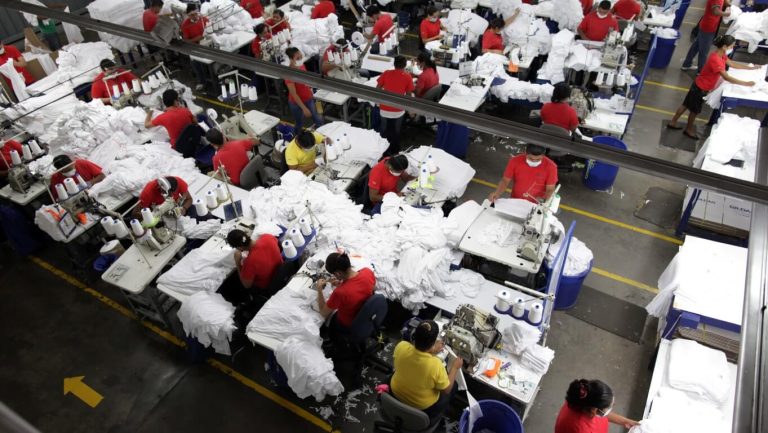21 de marzo 2020

The Return of the Military

PUBLICIDAD 1M
PUBLICIDAD 4D
PUBLICIDAD 5D
Uncertainty in the informal economy in the face of measures that could be needed to prevent massive contagion from the Coronavirus

Among the workers in companies that operate within the free trade zones and the sea of vendors, motorcycle taxis, and payday lenders that orbit around them, there’s a mix of acceptance and resignation before the possibility of a quarantine being declared.
Raquel Rodriguez, a lender, already had her face mask ready even before the official reports of the first confirmed infection. She states: “from this moment, we’re feeling” the effects of the health crisis on the economy.
In her case, it’s because “many of my clients have already been laid off. That’s affected me a little, but up until now, God hasn’t abandoned me. But if they close the zone down completely, I don’t know. I’m afraid my blood pressure would go way up.”
Maria del Socorro Chavarria sells bread and butter at the entrance to one of the companies in the zone, a business that doesn’t generate a huge income. She notes that a quarantine order “would affect us economically, because we couldn’t keep our business going, and we’d have to use the small reserves we have for our food.”
Judith Castro is taking all the preventive measures that they taught her in the company, and is also applying them at home, to safeguard her children’s health. In addition to seeing them healthy, she also wants them to be well fed.
That’s the reason the idea that they could order the workers to stay at home to slow the rate of contagion disturbs her. “In that case – What are we going to do? If we don’t work, we don’t get paid. There’s no food. And that’s the main thing – food. I don’t think we could stand it for much time,” she admits.
Wiston Cortes drives a motorcycle taxi in which he transports passengers from the north highway into the neighborhood. He also takes workers from the factory to the bus stops and vice versa. He explains that he’s had to prioritize his business over his health.
“I’ve thought about wearing a mask as a form of prevention, but then the passengers will think that I’m sick, and they won’t want to ride with me,” he says.
He’s also concerned about the possibility of an order to close the factories, because “we transport people from the bus stops to the free trade zone, and if they close down, we lose our income. If they close the other companies, we could no longer transport people out of the neighborhood because they wouldn’t be going to work anymore.”
Some have placed their faith in God to stem the epidemic, while others still confide in the government to avoid the propagation of the virus. Like dona Maria del Socorro Chavarria, who believes in God All Mighty, and in “the comandante and companera Rosario”, in reference to Daniel Ortega, president of the Nicaraguan government and his wife and vice president Rosario Murillo.
Chavarria states that she knows about the crisis and “we’re hoping, with trust in God, that it won’t affect us so much, because we have the protection of Him up high, and also because the Ministry of Health is giving us guidance via the media,” as well as to the children in school.
She insists that “God’s protection is first, and we need to raise our prayers up to Him. (…) Coronavirus may come, all the plagues that have come may come, but I say: “Lord, immunize me. And I haven’t had dengue, chikungunya, nor any of the diseases that have come to Nicaragua,” she says proudly.
And while she thanks the celestial powers, she also thanks the earthly ones, recalling: “the measures that our good government has taken to guide us. The Comandante and the Companera Rosario speak via the media, and their communiques come out in all of the independent media and in all the media that exist here in Nicaragua.”
Rodriguez, the lender, feels that “the government is taking 100% of all the measures needed for any attack of that virus.” She highlights the importance of “the Cuban doctors that are going to come, or who are already here, I don’t know. For me, their coming is a blessing, and the fact that that they’re here for this emergency.”
She declares that she trusts in God, “but even so, since I have health problems, I also need to safeguard my life” using the mask, especially at the time she spoke, as she was going towards a health clinic.
Antonio Corea, 57, also works in a company in the free trade zone. He believes that if Nicaragua has gone so long without any cases of infection being known, it’s “through the work of God, and all the recommendations that the government and the media have given.”
He refers to the fact that he and his family listen to and comment on the news about the advance of the disease and “since most of them are Christians, they pray that it not affect us.”
Finally, the mother and free trade zone worker Judith Castro, has faith that she’ll go forward, “with God’s help, because everything must be placed in God’s hands. Kneel down and ask that the virus not attack us as much as in other countries. That he has compassion for Nicaraguans.”
PUBLICIDAD 3M
Periodista nicaragüense, exiliado en Costa Rica. Durante más de veinte años se ha desempeñado en CONFIDENCIAL como periodista de Economía. Antes trabajó en el semanario La Crónica, el diario La Prensa y El Nuevo Diario. Además, ha publicado en el Diario de Hoy, de El Salvador. Ha ganado en dos ocasiones el Premio a la Excelencia en Periodismo Pedro Joaquín Chamorro Cardenal, en Nicaragua.
PUBLICIDAD 3D